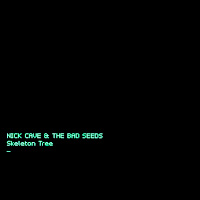In spite of all those tragedies, 2016 has at least given us several musical gifts to get us through the tough times. Below are my favorite albums of the year, though not necessarily in any sort of order of favoritism.
David Bowie - Blackstar
The genius of this album was apparent to me even when the lead, self-titled single had been the only thing released in late 2015. Embodying the spirit of Bowie in terms of unabashedly reinventing the rock icon, Blackstar was less about rock and roll and more about experimentation, a touch of jazz, many nods to the past, and a farewell that no one could have predicted (I felt he was saying goodbye by the end of the album, but more that this would be the last album and that he'd spend time with family and relax...not that he'd return to the stars so soon). Bowie is one of the few, maybe even the only one, who could turn their death into art. To this day, fans are still finding hidden Easter eggs in the Blackstar vinyl packaging with suggestions that there are many others that people have yet to uncover. It's painful to think this is the end, but I can't think of a more beautiful and touching parting gift from a truly unique artist to his fans. "There's a Starman waiting in the sky..."
Savages - Adore Life
I cannot sing the praises of Savages enough. Dubbed a post punk revival band, I scorn the label for it brings up images of bands like The Bravery, Franz Ferdinand, and Modest Mouse, which may have some musical nods back to the dark 80s genre, but are more influenced by it than anything else. Savages, on the other hand, dish out an English post punk formula that would have fit in perfectly alongside the likes of Joy Division, Siouxsie and the Banshees, and Bauhaus had they been making music in the early 80s as their predecessors were. Savages, to me, are the all-female version of Bauhaus - Jehnny Beth with the same sort of stage presence and theatrics as Peter Murphy, Ayse Hassan carrying the songs with a strong, gorgeous bass guitar turned deep lead, Fay Milton pushing each song along on the rhythm seat, and Gemma Thompson ripping out the same textural art guitar flourishes that Daniel Ash was so known for. Their second album, Adore Life, builds on the successes of their 2013 debut album while adding in a little more experimentation and, in places, slower and more reflective numbers, such as the album's title track. For the complete experience, be sure to catch these bad asses live - an incredible performance from start to finish full of so much raw energy it's unbelievable. It'll be a treat watching what they do next.
Peter Murphy - Wild Birds Live Tour
I've said it before and I'll say it again - it somehow isn't a year if I can't write something about Peter Murphy! In this case, Cleopatra finally gave life to an old House of Blues performance from the ($10 he's shuddering as I write this next bit) Godfather of Goth that took place in April 2000. While official video of that show has circulated YouTube for some time, and numerous bootlegs of the audio have circulated for even longer, Cleopatra finally decided now was the time to give it both a CD and double LP official release. Complete with Peter's interrupted "Indigo Eyes" (where his hand cramps up and he goes "I'm so gothic I'm dead!"), it's about time this show saw the light of day. Now if we could just get a live DVD of the video they took, we'd be golden...
Gary Numan - Here In The Black
It's been a very busy year for synth pioneer (arguably) Gary Numan. Numan has been crowd funding a new album via Pledge Music that brings fans along for the ride from the very beginning, something that is rarely done on Pledge Music (most bands run short campaigns to sell albums that are already finished...here, Numan is starting at the very beginning of writing and recording a new album, offering anecdotes from the studio and sharing rough demos periodically). The new year also brought his live show from the Hollywood Forever Cemetery during the Splinter tour to life. Released as a gorgeous set of picture disc records with an accompanying CD/DVD combo, you get a look at some of the recording of Splinter and most (but not all) of the performance from the Hollywood Forever. Despite some delays, the final product was gorgeous and masterfully done. Now to wait for that new album!
Iggy Pop - Post Pop Depression
The last few Iggy Pop albums have been lackluster at best, feeling like poor attempts to rekindle either the successes of the Stooges or of his early albums. Post Pop Depression, thought to be Pop's final album, is the strong note the proto-punk pioneer needed to go out on. Solid from start to finish, it's an album that doesn't try to hide the fact that Pop has gotten older. It embraces the change and evolution, drawing in enough from the past to pay its respects without trying to imitate or match it. The pairing with Queens of the Stone Age/Eagles of Death Metal member Josh Homme works perfectly, as each compliments the other and their two styles meld nicely. I hope this isn't the end of the music from Iggy Pop, but if it is, this was a damn fine album to go out on.
Nick Cave And The Bad Seeds - Skeleton Tree
How do you deal with grief, sorrow, and despair? Everyone handles these slightly differently and Nick Cave sought to explore those feelings and resolutions through the latest Bad Seeds album, Skeleton Tree. The album's theme, however, hit very close to home and very suddenly when Cave's young son died tragically. While most of the album was already completed prior to the accident, Cave went back and re-wrote portions to incorporate what he and his family were going through in the face of that loss. While it's hard to say how much of any one song relates to the incident, it's easy to feel the despair and heavy chested sorrow through the music. Taking a page from Leonard Cohen's book and crooning and speaking more than singing, this is an album that must be digested over time for its meaning to really hit home. Nick Cave and the Bad Seeds head out on tour early next year to support the album.
Leonard Cohen - You Want it Darker
Leonard Cohen has gone a long way from his hit classic "Hallelujah". Where his songs tended to be somewhat upbeat, You Want it Darker held true to its title, presenting darker themes, both lyrically and musically. Either from age and loss of his singing voice or to drive home the title's point even more, Cohen drops the singing in favor of somber spoken word, adding to the morose musical landscape. Deeply troubled by the passing of a long time friend, Marianne Ihlen, as well as numerous health issues within the last few years, Cohen wrote this album as a farewell of sorts, focusing on themes of death, religion, and the occasional bit of humor. Following interviews where Cohen claimed to be ready to die (then taking back what he said days later), 2016 passed cruel irony over Cohen with the 82 year old icon passing three weeks after his final album was released. We wanted it darker, and we definitely got it.
Mark Gemini Thwaite - Volumes
Though this gem probably won't be found on any major year end "best of" lists (though it should), former Mission/Peter Murphy/Gary Numan/Tricky/etc. guitarist Mark Gemini Thwaite ventured into a relatively unknown territory - a solo album. Not traditionally a singer, Thwaite opted to collaborate with several friends (and vocalists) to stitch together a debut album that highlights the diversity of Thwaite's playing abilities and musical interests. Though the numerous lead voices throughout the album may take some listeners a little more time to get used to, the album is solid in its music composition and vocal pairings. From the modern and brilliant ABBA cover of "Knowing Me, Knowing You" (featuring HIM's Ville Valo) to the infectious number "The Reaping" (with Ashton Nyte), Thwaite's solo album is catchy and makes a solid argument for why musicians should branch out into these kinds of projects more often. Currently touring with Ricky Warwick and the Fighting Hearts, we'll have to see what all MGT has in store for us in 2017.
Black Sugar Transmission - In The City's Arms
Speaking of other Peter Murphy guitarists, 2016 brought a glorious gift from Andee Blacksugar - a brand new double album. Pairing a bit of pop aesthetic to brilliant rock guitar solos, Black Sugar Transmission albums have always been a delightful mixing of experimentation with flair. In The City's Arms is a bit more experimental than his previous material, bringing in more industrial vibes ("Machinegun Sun"), heavier rock ("Puzzle"), and even a ballad here and there ("In The City's Arms"). A champion of self-produced music, Blacksugar proves you don't need a label or huge fancy recording studio to churn out quality music. You can pick up this work of art and his prior albums through his Bandcamp page.
Preoccupations - Preoccupations
When I first saw someone talk about Preoccupations earlier this year, they described it as a melding of Bauhaus and Joy Division. Obviously I had to check it out. Formerly known as Viet Cong, the electronic noise rock outfit's second album is solid. Though I'd say the sound is less a melding of Joy Division and Bauhaus and more of a melding between And One and Joy Division. To each their own, right? Regardless, Preoccupations along with the likes of Savages give hope for the future of dark art rock.
What albums did I miss? What are your favorites from this year? Let us know in the comments!



















